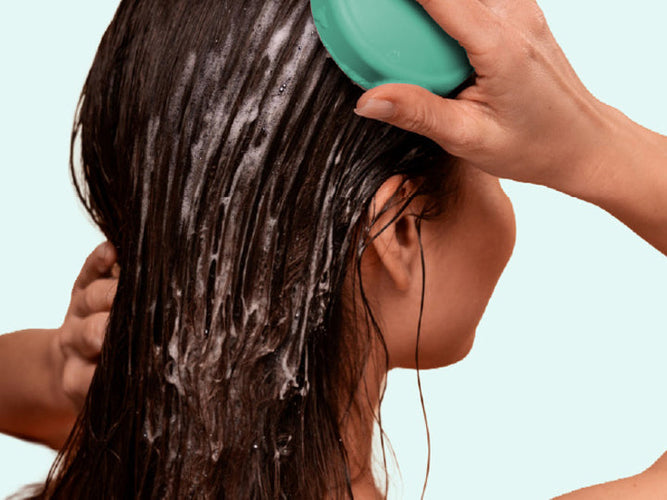Imagine this: you're in the shower, your hair lathers up nicely... but that lovely foam often comes from sulphates. These clean thoroughly but can also dry out your scalp and make your hair look dull. That is why more and more people are choosing shampoo without sulphates and parabens. Such a sulphate-free shampoo is milder and better suited to the natural balance of your hair and scalp. Curious why shampoo without sulphates and parabens is so popular? Read on!
What do sulphates do to your skin?
Two well-known sulphates are SLS and SLES. SLS (Sodium Lauryl Sulphate) and SLES (Sodium Laureth Sulphate) are powerful cleansing agents that remove oil from your hair and skin. That might sound useful, but the issue is: they are not very selective. They wash away not just dirt and excess sebum, but also your skin’s natural protective layer: the so-called skin barrier.
This barrier is made up of lipids and proteins that keep your scalp healthy and hydrated. When it gets damaged, your skin can more easily:
- Dry out
- Itch or become irritated
- React sensitively to other substances (like fragrance or preservatives)
People with sensitive skin or skin conditions (like eczema) often find SLS/SLES too harsh. That’s why sulphate-free shampoos are often a better choice for scalp that are easily out of balance.
Why choose a sulphate-free and paraben-free shampoo?
Keeping your scalp happy
Do you often suffer from itchiness or a dry scalp? Then shampoo without sulphates can feel like a relief. These gentle cleansers do their job without fuss.
Preserving your hair colour
Do you colour your hair? Then you want that lovely shade to last as long as possible. Sulphate-free shampoos help prevent fading after just a few washes.
Sulphate-free shampoo for curly or frizzy hair
Curly or frizzy hair tends to be drier by nature. A sulphate-free shampoo helps maintain bounce and definition without drying your strands or causing frizz.
Conscious beauty choices: paraben-free and natural
More people are checking the ingredients of their personal care products. Choosing mild, natural and skin-friendly options often means saying goodbye to sulphates and parabens.
Eco-friendlier alternatives without SLS and SLES
Sulphates like SLS and SLES are synthetic compounds that do not break down easily in nature. When rinsed down the drain, they can end up in surface water where they may:
- Harm aquatic life such as fish and plankton
- Affect water quality
- Cause foaming in rivers and streams
Although water treatment plants capture much of it, sulphates are not always fully removed. That’s why many people are opting for eco-friendlier options like plant-based cleansers that break down more easily in the environment.

Are they really that bad?
The short answer: not for everyone. Sulphates can originate from natural sources such as coconut oil and can be helpful if you have oily hair. Parabens are not necessarily the villain either: they are declared safe when used within regulated limits. But if you have sensitive skin, coloured hair or simply prefer a gentler routine for yourself and the planet, there are excellent alternatives. Like the Neofollics Growth Stimulating Shampoo or Neofollics Scalp Therapy Exfoliating Shampoo.
How to choose the best shampoo without sulphates and parabens
Check the ingredients list
If you see SLS, SLES, methylparaben or propylparaben? Skip it. Look instead for terms like “mild cleansing”, “pH-balanced” or certifications like Ecocert.
Consider your hair type
Do you have dry hair, curls, a sensitive scalp or recently coloured hair? Then sulphate-free is a great option. Have oily hair? Choose a mild cleanser with ingredients like zinc.
Go for quality
Not every “sulphate-free” shampoo is created equal. Choose brands that are dermatologically tested and transparent about their ingredients. Like Neofollics.
Frequently asked questions
Why does my shampoo foam less?
Less foam does not mean less clean. Foam is mostly cosmetic. Sulphate-free shampoos clean just fine, though they may feel different.
Will my hair get oilier when I switch?
Sometimes, at first. Your scalp needs time to adjust. Give it one to two weeks and you’ll likely notice a difference.
Are natural shampoos always better?
Not necessarily. “Natural” sounds great but always check whether a product is truly free from sulphates and parabens and suitable for your hair type.
Can sulphates cause damage?
With daily use or on sensitive skin, yes, they can.
Is paraben-free always safe?
If a product is properly preserved with safe alternatives, yes. Otherwise, you risk spoilage. Always check the full formula.
Can sulphate-free shampoo help with hair loss?
Indirectly, yes. By calming your scalp and reducing irritation, it creates a healthier base for hair growth.
Can I use sulphate-free shampoo if I have dandruff?
Yes, especially if you have a dry or sensitive scalp. Just make sure to choose a version with active ingredients like zinc or tea tree oil.
Conclusion
Shampooing without sulphates and parabens is more than just a trend. It is a conscious choice focused on health, care and sustainability. If you have curls, coloured hair or a sensitive scalp, you will likely notice the difference straight away: your hair feels softer, frizzes less and retains its colour and shine for longer.
But the benefits go beyond appearance. By choosing gentler ingredients, you reduce the chance of irritation, allergic reactions or disruption of your scalp’s natural balance. And because many sulphate-free shampoos are also free from synthetic fragrances and silicones, they are often better for both your scalp and the environment. A win-win.
If you are looking to care more mindfully for your body, your health and the planet, a sulphate- and paraben-free shampoo is a logical step. There is no one-size-fits-all, but chances are you – like many others – will discover that your hair has never felt better. Choose mildness and see what it can do for your hair.
Sources
Gavazzoni Dias, M.F.R. (2015). Hair cosmetics: an overview. International Journal of Trichology.
Darbre, P.D. (2006). Environmental oestrogens, cosmetics and breast cancer. Best Practice & Research Clinical Endocrinology & Metabolism.
SCCS - Scientific Committee on Consumer Safety (EU). Safety of parabens in cosmetic products.
Journal of the American Academy of Dermatology (various publications)
EU Cosmetics Regulation (EC) No 1223/2009
This information does not replace professional medical advice. If in doubt, always consult a doctor or specialist.













